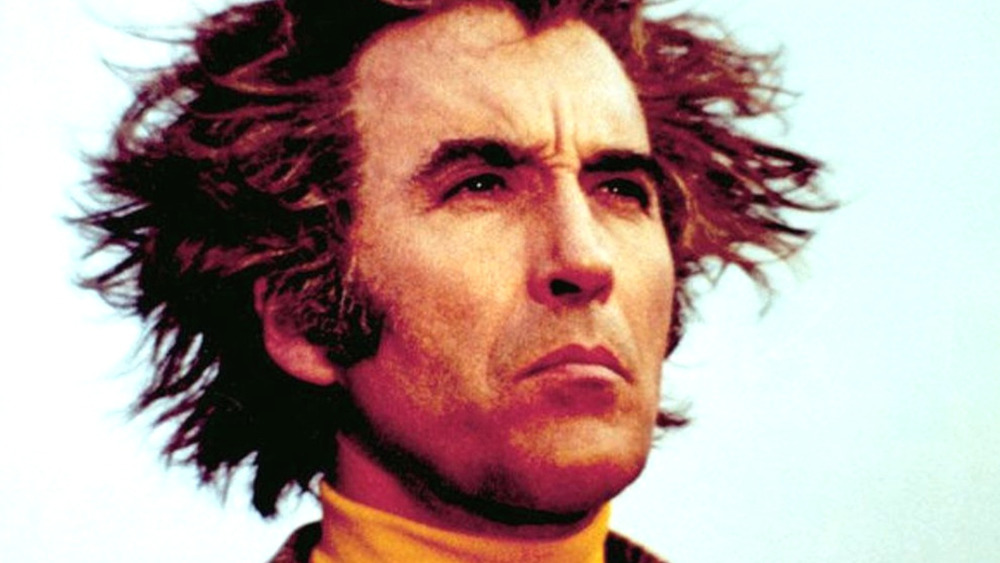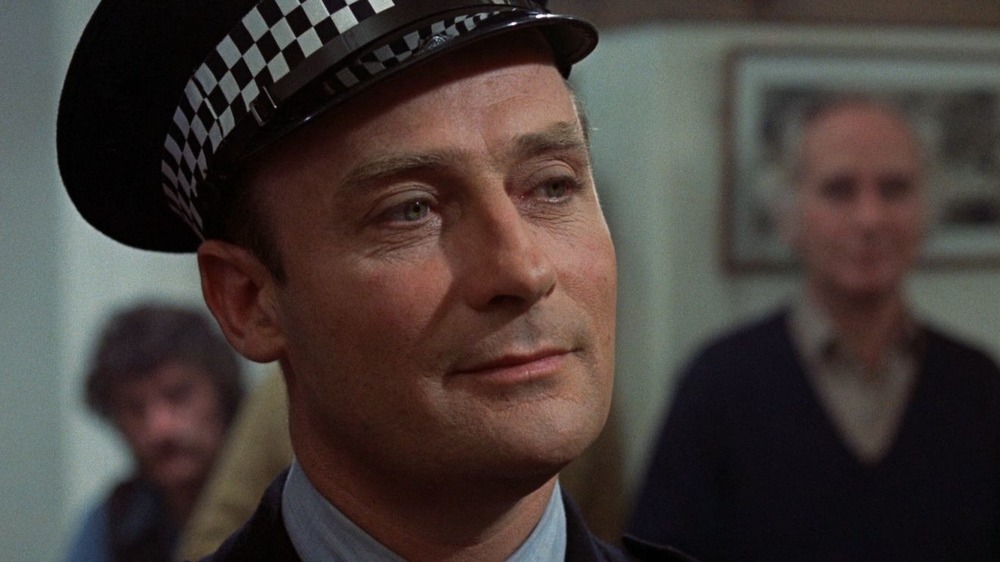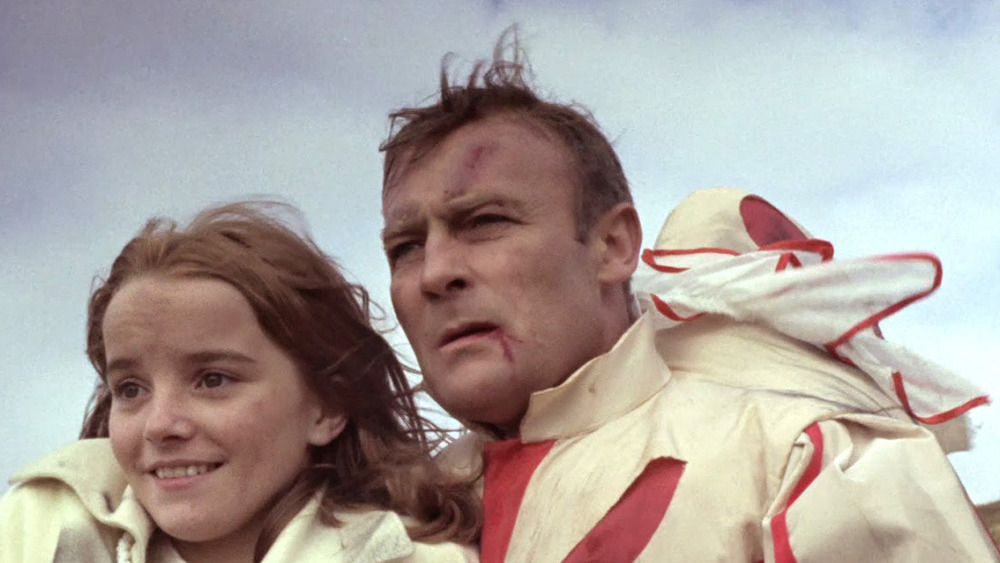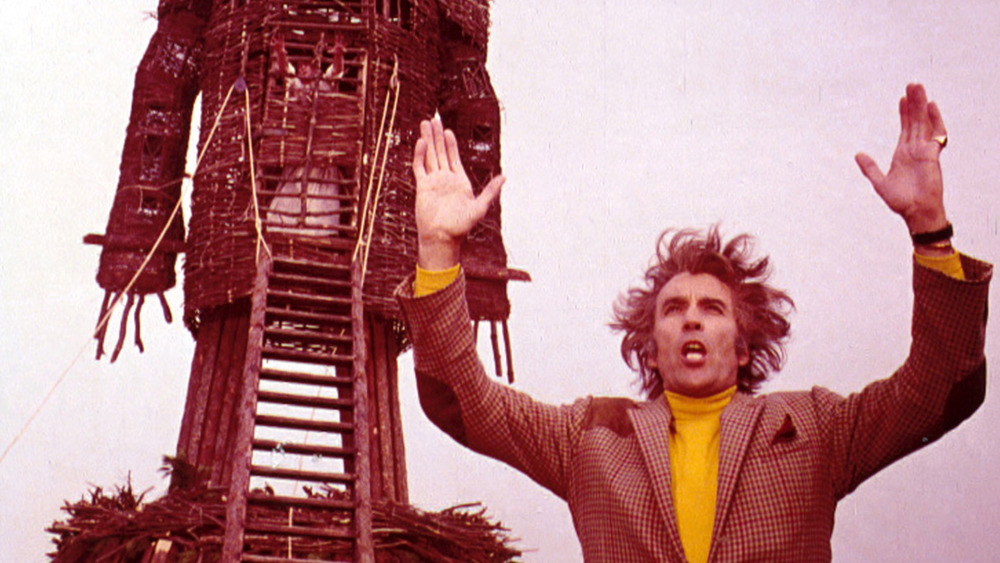The Ending Of The Wicker Man Explained
The 2010s ushered in an era of successful and acclaimed art-house horror. Movies like It Follows, The Babadook, and Midsommar all tackle complex issues through the lens of horror. Often visually striking and always psychologically complex, many of the horror movies from the last decade have helped new audiences realize the nuanced depths the worlds of horror have to offer.
But this type of horror movie isn't new. And while all the above films are critically acclaimed, can any of their creators claim to have crafted an art-house horror musical? One of the most influential cult movies of all time can make that claim — 1973's The Wicker Man.
Many people are familiar with The Wicker Man only by reputation, and even then more often by the reputation of the 2006 Nicolas Cage remake. In fact, the most infamous scene from the remake isn't even in the final cut of the film. But the original The Wicker Man is no joke. In fact, it has one of the scariest endings of any horror movie ever made.
The Wicker Man is brilliant in part because its setup is so simple yet intriguing. Sergeant Howie (Edward Woodward) arrives on the private island of Summerisle after being sent a message: A young girl named Rowan Morrison (Gerry Cowper) is missing, and Howie is asked to investigate the disappearance. While the setup may feel like it could appear in an episode of any detective procedural, where the story takes both Howie and the audience remains disturbing and challenging even to this day.
This is the ending of The Wicker Man explained.
Is Sergeant Howie the right sort of adult for sacrifice?
The Wicker Man ends with Lord Summerisle (Christopher Lee) and the pagan residents of the island burning Sergeant Howie to death inside of a large wicker man. Howie is a human offering to the gods of the island, and the ritual is being done with one simple hope in mind — that the coming year's harvest will be bountiful.
The surface explanation for the ending of The Wicker Man is that the peoples of Summerisle cannot afford to have another bad crop, and that they are willing to do anything they can — including murder a man in cold blood — to ensure their own prosperity. But that interpretation would require we see the pagans of Summerisle as monsters, and it's clear throughout the film that the character we're meant to question most is Sergeant Howie himself.
Sergeant Howie believes that the plan is to sacrifice Rowan Morrison to the gods for a good crop, but he's wrong. Lord Summerisle explains that a good crop requires "the most acceptable sacrifice," and, while a child is a good sacrifice, he sought "the right kind of adult" for this occasion. Howie is the right kind of adult because he is "a man who has come here with the power of a king, but representing the law." Howie is a virgin, and he is a fool who played his part of his own volition.
In the DVD special feature documentary, Burnt Offering – The Cult of The Wicker Man, Edward Woodward himself describes Howie as a religious fanatic, which is the key to understanding what makes The Wicker Man's ending so complex and horrifying. The question that lingers as the credits roll is: What does burning a man like Sergeant Howie represent to us in the real world?
Howie's hypocrisy leads him to his fate
Sergeant Howie is a devout Christian, and sees himself as both an absolute moral authority and an authority in matters of the written law. "A king, but representing the law" is a perfect description of Howie. Throughout the runtime of The Wicker Man, Howie casts judgment on virtually every aspect of Summerisle society. He repeatedly condemns all pagan rituals, feigning superiority, while secretly craving and coveting what the pagans have — the right of sexual freedom.
There are two parallel scenes which are critical to understanding both Sergeant Howie and his fate. The first comes when Howie meets Lord Summerisle for the first time, shortly after witnessing women dancing and leaping naked over fire in a rite dedicated to parthenogenesis — their wish to bear the fruit of the god of fire. Howie finds this disgusting, but Lord Summerisle rightly points out that one of the core figures of Christian belief is the Virgin Mary, a woman who bears the fruit of God without an act of sexual intercourse.
But Howie's hypocrisy isn't truly laid bare until later, when he presses his body up against a wall while the beautiful Willow (Britt Ekland) dances naked on the other side. Howie desperately wants Willow even though she is a pagan who has sex with the men of the island freely. These two moments show us the conflict within Howie, and it shows an ability within him to choose to accept himself and the peoples of Summerisle for who they are or to continue judging them and placing himself as moral authority over all.
Unfortunately for Howie, he chooses the latter, and that choice makes him the fool of Summerisle's wicker man ritual.
Why The Wicker Man remains relevant
The ending of The Wicker Man is a final affirmation of Sergeant Howie's hypocrisy. Howie insists that he will find new life. "As a Christian, I hope for resurrection," Howie explains. "And even if you kill me now, it is I who will live again." However, as Howie burns inside the wicker man, the game is up and his belief is burned away, too. He screams because perhaps he doesn't actually believe he will be resurrected after all. Howie spends his entire time on Summerisle judging everyone from a place of Christian authority, but when his faith is challenged in the final horrifying moments, it would seem his faith topples a house of cards.
What is the point of all that belief in the first place? Is it to help others like Rowan Morrison, or is it to unfairly judge others as Howie repeatedly does?
The Wicker Man's ending is still relevant because we continue to find ourselves asking these questions. Is it right to demand that others follow religious law if they are not that adherents to that religion themselves? Is it fair when those demanding the rules be followed don't adhere to the laws themselves? And where is the line between someone who defends the law and one who uses it to harass, attack, and even murder others? These were questions being asked in the 1970s, and they remain questions we ask ourselves today.
In the end, The Wicker Man is a condemnation not just of one man, but of the systems of power that allow him to exhibit control over others without question. By allowing that power to be reversed on Howie, The Wicker Man exposes the consequence of his hypocrisy. If Howie doesn't deserve to burn, then audiences must question the validity of laws which allow for the suffering of others based solely on religious belief, too.



